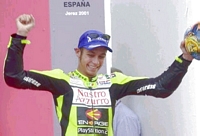He’s insanely talented. He has won Grand Prix after Grand Prix, and seems absolutely invulnerable. The gods love him. He can take certain defeat and, using a seemingly endless reserve of luck, skill, and cojones, turn it into a victory. His rivals seethe with bitterness and jealousy, and fans wonder if the sport will ever be free of his domination.
I am speaking, of course, about MotoGP champion Valentino Rossi.
What, you thought I meant Michael Schumacher? It’s true, much of what I wrote also describes him, but his domination of Formula 1 has gone beyond competitiveness and into the realm of dadaist art. Every two weeks we gather to watch the race, over an unhealthy breakfast of crêpes, sausages, and strong tea, and every week we have the same conversation: “So, who is going to come in third?” That’s what the sport has been reduced to: wondering who is going to come in third.
There’s a line that we walk here, when talking about this, a line of whining that shouldn’t be crossed. The same complaints that people make about Schumacher’s effect on the sport today have been made about Tiger Woods, and about the Williams sisters, and about Lance Armstrong. We like our contests close; we like drama. When someone comes in who is so dominant that the question is no longer “Will he win the championship?” but “Will he win the championship this month?” well, some might argue that that makes the sport less interesting to watch. The other side of that coin is that we are blessed: in the first part of the twenty-first century, we have the privilege to watch one of the best drivers that has ever raced, at the height of his powers, drive one of the most magnificent cars ever created. Complaining about that seems somewhat picayune.

Valentino Rossi
And yet…and yet, there is MotoGP. Where young Valentino Rossi dominates like Schumacher while putting on a better show. “Il Dottore,” they call him — the doctor — and watching him slice through the corners in South Africa was like watching a surgeon work, swift and sure. Rossi this season gave up his Honda ride and is with Yamaha, riding an unquestionably inferior machine. If Michael Schumacher drove a Renault instead of a Ferrari, no one doubts that he would still find a way to win a race. So too with Rossi.
Some of this is the nature of their respective sports. No one questions that Lance Armstrong’s victories would not be possible without the help of his team. No one questions that the money that’s poured into the technology surrounding him — his clothes, his bike, his food — has a significant impact in helping him win. But at the end of the day, we see him climbing a mountain on a bike with his legs, and we see him do it faster than the other guys. Even with all the support he gets, the victory is his. Likewise, the physicality of a MotoGP race, the leaning a bike to impossible angles, the sense of imminent peril, all combine to tell us that it’s not the bike that wins all those races, it’s Rossi. We may know intellectually that a Formula 1 driver is under extreme G-forces and must be in top mental and physical shape to win a race, but it is the nature of auto racing to make it hard for the viewer to see or experience that. And so there’s a tendency to say “Well, if you put any good driver in that Ferrari, he’d win as much as Schumacher. Really, it’s Jean Todt and Ross Brawn and the engineers who are winning those races.”
Steve Matchett has written about this extensively: there’s an inherent tension when you’ve got a race where you’re interested in determining, at the same time, who has the best car and who is the best driver. The only way to really be sure that someone is the best driver is to homologate the formula so tightly that the cars are, effectively, identical, as in Formula 3000. This runs contrary to the desires of the major investors in the sport — no, I don’t mean the tobacco companies, I mean the other major investors, the car companies — to win renown and a positive marketing aura by winning races in their name.
Rossi recently test drove a Ferrari Formula 1 car. No one knows if it was just a courtesy drive, or if he’s seriously considering a leap into the cage. The FIA is in the process of rewriting the Formula 1 rules again in order to encourage “closer racing” and “more overtaking.” The example they gave of what good racing looks like was the battle between Rossi and Max Biaggi in South Africa.
So, any bets on who will come in third in Barcelona this weekend?
This article originally appeared at FastMachines, the motorsports weblog.




